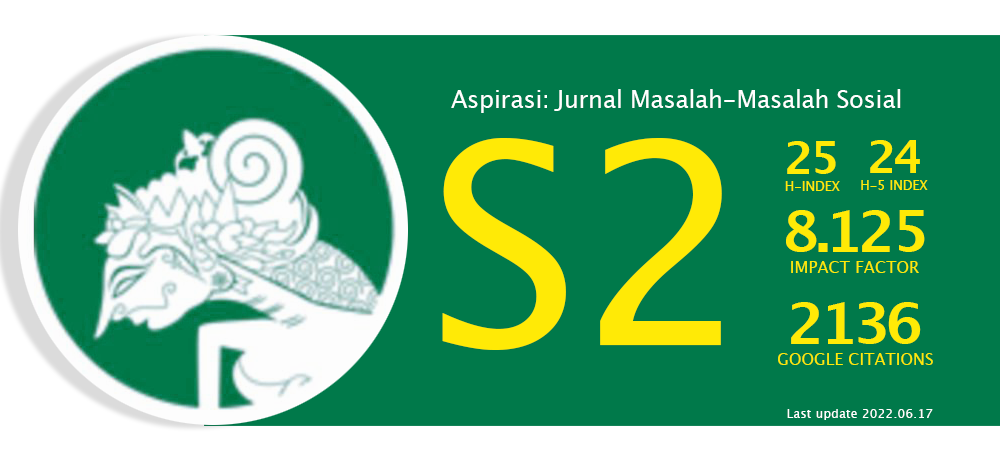- Focus and Scope
- Section Policies
- Peer Review Process
- Publication Frequency
- Open Access Policy
- Publication Ethics and Malpractice Statement
- Tools
- Abstracting & Indexing
- Archiving
- Screening for Plagiarism
- Publication Fees
- Erratum and Corrigendum
- Direct Marketing
- Revenue Sources
- Advertising
- Ownership and Management
- License
- Retraction
Focus and Scope
Aspirasi: Jurnal Masalah-Masalah Sosial is a multidisciplinary journal on social issues that publishes articles from parliamentary perspectives, covering both library and field studies. The journal places emphasis on various aspects related to social issues within the Indonesian context, including in the fields of sociology, psychology, education, environment, religion, and health.
Manuscripts submitted must be current policy studies related to the legislative process of DPR RI.
Section Policies
Article
isi tulisan
-
Peer Review Process
We are committed to prompt evaluation and publication of fully accepted papers in Jurnal Aspirasi. To maintain a high-quality publication, all submissions undergo a process of double-blind peer-review by peer-reviewer of Aspirasi Journal. Characteristics of the peer review process are as follows:
- Simultaneous submissions of the same manuscript to different journals will not be tolerated.
- Manuscripts with contents outside the scope will not be considered for review.
- Papers will be reviewed by at least 2 experts as suggested by the editorial board.
- In addition, Editors will have the authority to recommend additional reviews when needed. Authors will be informed when Editors decide further review is required.
- All publication decisions are made by the journal's Editor in Chief on the basis of the reviewer reports. Authors of papers that are not accepted are notified promptly.
- All submitted manuscripts are treated as confidential documents. We expect our Board of Reviewing Editors and reviewers to treat manuscripts as confidential material as well.
- Editors and reviewers involved in the review process should disclose conflicts of interest resulting from direct competitive, collaborative, or other relationships with any of the authors, and remove oneself from cases in which such conflicts preclude an objective evaluation. Privileged information or ideas that are obtained through peer review must not be used for competitive gain.
- Our peer-review process is confidential and the identities of reviewers cannot be revealed. The articles are then sent to two reviewers at the position Double Blind Review. Notes from the reviewers then sent back to the author to be adapted to the standards of journal writing. The decision of the revised manuscript will be re-evaluated in the meeting of the editorial board. Later, the decision of the editor in the final meeting will be informed to the author.
Publication Frequency
Publish twice a year: June and December
Open Access Policy
This journal provides immediate open access to its content on the principle that making research freely available to the public supports a greater global exchange of knowledge.
This journal is open access journal which means that all content is freely available without charge to users or / institution. Users are allowed to read, download, copy, distribute, print, search, or link to full text articles in this journal without asking prior permission from the publisher or author. This is in accordance with Budapest Open Access Initiative

Budapest Open Access Initiative
For various reasons, this kind of free and unrestricted online availability, which we will call open access, has so far been limited to small portions of the journal literature. But even in these limited collections, many different initiatives have shown that open access is economically feasible, that it gives readers extraordinary power to find and make use of relevant literature, and that it gives authors and their works vast and measurable new visibility, readership, and impact. To secure these benefits for all, we call on all interested institutions and individuals to help open up access to the rest of this literature and remove the barriers, especially the price barriers, that stand in the way. The more who join the effort to advance this cause, the sooner we will all enjoy the benefits of open access.
The literature that should be freely accessible online is that which scholars give to the world without expectation of payment. Primarily, this category encompasses their peer-reviewed journal articles, but it also includes any unreviewed preprints that they might wish to put online for comment or to alert colleagues to important research findings. There are many degrees and kinds of wider and easier access to this literature. By "open access" to this literature, we mean its free availability on the public internet, permitting any users to read, download, copy, distribute, print, search, or link to the full texts of these articles, crawl them for indexing, pass them as data to software, or use them for any other lawful purpose, without financial, legal, or technical barriers other than those inseparable from gaining access to the internet itself. The only constraint on reproduction and distribution, and the only role for copyright in this domain, should be to give authors control over the integrity of their work and the right to be properly acknowledged and cited.
While the peer-reviewed journal literature should be accessible online without cost to readers, it is not costless to produce. However, experiments show that the overall costs of providing open access to this literature are far lower than the costs of traditional forms of dissemination. With such an opportunity to save money and expand the scope of dissemination at the same time, there is today a strong incentive for professional associations, universities, libraries, foundations, and others to embrace open access as a means of advancing their missions. Achieving open access will require new cost recovery models and financing mechanisms, but the significantly lower overall cost of dissemination is a reason to be confident that the goal is attainable and not merely preferable or utopian.
To achieve open access to scholarly journal literature, we recommend two complementary strategies.
I. Self-Archiving: First, scholars need the tools and assistance to deposit their refereed journal articles in open electronic archives, a practice commonly called, self-archiving. When these archives conform to standards created by the Open Archives Initiative, then search engines and other tools can treat the separate archives as one. Users then need not know which archives exist or where they are located in order to find and make use of their contents.
II. Open-access Journals: Second, scholars need the means to launch a new generation of journals committed to open access, and to help existing journals that elect to make the transition to open access. Because journal articles should be disseminated as widely as possible, these new journals will no longer invoke copyright to restrict access to and use of the material they publish. Instead they will use copyright and other tools to ensure permanent open access to all the articles they publish. Because price is a barrier to access, these new journals will not charge subscription or access fees, and will turn to other methods for covering their expenses. There are many alternative sources of funds for this purpose, including the foundations and governments that fund research, the universities and laboratories that employ researchers, endowments set up by discipline or institution, friends of the cause of open access, profits from the sale of add-ons to the basic texts, funds freed up by the demise or cancellation of journals charging traditional subscription or access fees, or even contributions from the researchers themselves. There is no need to favor one of these solutions over the others for all disciplines or nations, and no need to stop looking for other, creative alternatives.
Open access to peer-reviewed journal literature is the goal. Self-archiving (I.) and a new generation of open-access journals (II.) are the ways to attain this goal. They are not only direct and effective means to this end, they are within the reach of scholars themselves, immediately, and need not wait on changes brought about by markets or legislation. While we endorse the two strategies just outlined, we also encourage experimentation with further ways to make the transition from the present methods of dissemination to open access. Flexibility, experimentation, and adaptation to local circumstances are the best ways to assure that progress in diverse settings will be rapid, secure, and long-lived.
The Open Society Institute, the foundation network founded by philanthropist George Soros, is committed to providing initial help and funding to realize this goal. It will use its resources and influence to extend and promote institutional self-archiving, to launch new open-access journals, and to help an open-access journal system become economically self-sustaining. While the Open Society Institute's commitment and resources are substantial, this initiative is very much in need of other organizations to lend their effort and resources.
We invite governments, universities, libraries, journal editors, publishers, foundations, learned societies, professional associations, and individual scholars who share our vision to join us in the task of removing the barriers to open access and building a future in which research and education in every part of the world are that much more free to flourish.
Publication Ethics and Malpractice Statement
Aspirasi: Jurnal Masalah-Masalah Sosial aims to be a leading peer-reviewed platform and an authoritative source of information. We publish original research papers, review articles and case studies focused on social issues in Indonesian context with special reference to social development, social policy, political social development, and social welfare that has neither been published elsewhere in any language, nor is it under review for publication anywhere. This following statement clarifies ethical behavior of all parties involved in the act of publishing an article in this journal, including the author, the editor, the reviewer, and the publisher. This statement is based on COPE’s Best Practice Guidelines for Journal Editors. As such, this journal follows the COPE Code of Conduct and Best Practice Guidelines for Journal Editors and the Code of practices for Journal Publishers.
A selection of key points is included below, but you should always refer to the three documents listed above for full details.
Duties of Authors
- Reporting Standards: Authors should present an accurate account of the original research performed as well as an objective discussion of its significance. Researchers should present their results honestly and without fabrication, falsification or inappropriate data manipulation. A manuscript should contain sufficient detail and references to permit others to replicate the work. Fraudulent or knowingly inaccurate statements constitute unethical behavior and are unacceptable. Manuscripts should follow the submission guidelines of the journal.
- Originality and Plagiarism: Authors must ensure that they have written entirely original work. The manuscript should not be submitted concurrently to more than one publication unless the editors have agreed to co-publication. Relevant previous work and publications, both by other researchers and the authors’ own, should be properly acknowledged and referenced. The primary literature should be cited where possible. Original wording taken directly from publications by other researchers should appear in quotation marks with the appropriate citations.
- Multiple, Redundant, or Concurrent Publications: Author should not in general submit the same manuscript to more than one journal concurrently. It is also expected that the author will not publish redundant manuscripts or manuscripts describing same research in more than one journal. Submitting the same manuscript to more than one journal concurrently constitutes unethical publishing behavior and is unacceptable. Multiple publications arising from a single research project should be clearly identified as such and the primary publication should be referenced
- Acknowledgement of Sources: Authors should acknowledge all sources of data used in the research and cite publications that have been influential in determining the nature of the reported work. Proper acknowledgment of the work of others must always be given.
- Authorship of the Paper: The authorship of research publications should accurately reflect individuals’ contributions to the work and its reporting. Authorship should be limited to those who have made a significant contribution to conception, design, execution or interpretation of the reported study. Others who have made significant contribution must be listed as co-authors. In cases where major contributors are listed as authors while those who made less substantial, or purely technical, contributions to the research or to the publication are listed in an acknowledgement section. Authors also ensure that all the authors have seen and agreed to the submitted version of the manuscript and their inclusion of names as co-authors.
- Disclosure and Conflicts of Interest: All authors should clearly disclose in their manuscript any financial or other substantive conflict of interest that might be construed to influence the results or interpretation of their manuscript. All sources of financial support for the project should be disclosed.
- Fundamental Errors in Published Works: If the author discovers a significant error or inaccuracy in the submitted manuscript, then the author should promptly notify the journal editor or publisher and cooperate with the editor to retract or correct the paper.
- Hazards and Human or Animal Subjects: The author should clearly identify in the manuscript if the work involves chemicals, procedures or equipment that have any unusual hazards inherent in their use.
Duties of Editor
- Publication Decisions: Based on the review report of the editorial board, the editor can accept, reject, or request modifications to the manuscript. The validation of the work in question and its importance to researchers and readers must always drive such decisions. The editors may be guided by the policies of the journal's editorial board and constrained by such legal requirements as shall then be in force regarding libel, copyright infringement and plagiarism. The editors may confer with other editors or reviewers in making this decision. Editors have to take responsibility for everything they publish and should have procedures and policies in place to ensure the quality of the material they publish and maintain the integrity of the published record.
- Review of Manuscripts: Editor must ensure that each manuscript is initially evaluated by the editor for originality. The editor should organize and use peer review fairly and wisely. Editors should explain their peer review processes in the information for authors and also indicate which parts of the journal are peer reviewed. Editor should use appropriate peer reviewers for papers that are considered for publication by selecting people with sufficient expertise and avoiding those with conflicts of interest.
- Fair Play: The editor must ensure that each manuscript received by the journal is reviewed for its intellectual content without regard to sex, gender, race, religion, citizenship, etc. of the authors. An important part of the responsibility to make fair and unbiased decisions is the upholding of the principle of editorial independence and integrity. Editors are in a powerful position by making decisions on publications, which makes it very important that this process is as fair and unbiased as possible.
- Confidentiality: The editor must ensure that information regarding manuscripts submitted by the authors is kept confidential. Editors should critically assess any potential breaches of data protection and patient confidentiality. This includes requiring properly informed consent for the actual research presented, consent for publication where applicable.
- Disclosure and Conflicts of Interest: The editor of the Journal will not use unpublished materials disclosed in a submitted manuscript for his own research without written consent of the author. Editors should not be involved in decisions about papers in which they have a conflict of interest
Duties of Reviewers
- Confidentiality: Information regarding manuscripts submitted by authors should be kept confidential and be treated as privileged information. They must not be shown to or discussed with others except as authorized by the editor.
- Acknowledgement of Sources: Reviewers must ensure that authors have acknowledged all sources of data used in the research. Reviewers should identify relevant published work that has not been cited by the authors. Any statement that an observation, derivation, or argument had been previously reported should be accompanied by the relevant citation. The reviewers should notify the journal immediately if they come across any irregularities, have concerns about ethical aspects of the work, are aware of substantial similarity between the manuscript and a concurrent submission to another journal or a published article, or suspect that misconduct may have occurred during either the research or the writing and submission of the manuscript; reviewers should, however, keep their concerns confidential and not personally investigate further unless the journal asks for further information or advice.
- Standards of Objectivity: Review of submitted manuscripts must be done objectively and the reviewers should express their views clearly with supporting arguments. The reviewers should follow journals’ instructions on the specific feedback that is required of them and, unless there are good reasons not to. The reviewers should be constructive in their reviews and provide feedback that will help the authors to improve their manuscript. The reviewer should make clear which suggested additional investigations are essential to support claims made in the manuscript under consideration and which will just strengthen or extend the work
- Disclosure and Conflict of Interest: Privileged information or ideas obtained through peer review must be kept confidential and not used for personal advantage. Reviewers should not consider manuscripts in which they have conflicts of interest resulting from competitive, collaborative, or other relationships or connections with any of the authors, companies, or institutions connected to the papers. In the case of double-blind review, if they suspect the identity of the author(s) notify the journal if this knowledge raises any potential conflict of interest.
- Promptness: The reviewers should respond in a reasonable time-frame. The reviewers only agree to review a manuscript if they are fairly confident they can return a review within the proposed or mutually agreed time-frame, informing the journal promptly if they require an extension. In the event that a reviewer feels it is not possible for him/her to complete review of manuscript within stipulated time then this information must be communicated to the editor, so that the manuscript could be sent to another reviewer.
Tools



Abstracting & Indexing
SINTA
Accredited Sinta2 by Ministry of Research and Technology/ National Research and Innovation Agency since 2018.
h-index: 39 | i10-index: 108 | citations: 5581 | impact factor: 6.58333
DIMENSIONS
indexed since 2018.
INDONESIAN SCIENTIFIC JOURNAL DATABASE
indexed since 2010.
MENDELEY
GOOGLE SCHOLAR
h-index: 42 | i10-index: 135 | citations: 7322
Archiving
This journal utilizes the LOCKSS system to create a distributed archiving system among participating libraries and permits those libraries to create permanent archives of the journal for purposes of preservation and restoration.
Screening for Plagiarism
Aspirasi: Jurnal Masalah-Masalah Sosial recognizes that plagiarism is not acceptable for all author and therefore establishes the following policy stating specific actions (penalties) when plagiarism is identified by Aspirasi: Jurnal Masalah-Masalah Sosial anti-plagiarism software detection (we are using turnitin.com ) in an article that is submitted for publication. A maximum of 20% of similarities is allowed for the submitted papers. Should we find more than 20% of the similarity index, the article will be returned to the author for correction and resubmission.
Publication Fees
There are no charges for article submission and publication. Additionally, we do not offer a fast-track review process.
Erratum and Corrigendum
Policy and best practice: errata & corrigenda
For the purposes of this document the term Editorencompasses all Editor title variations and is limited to those that have final acceptance responsibility.
Changes/Additions to accepted articles
All content of published articles are subject to the editorial review process, organized by and under the auspices of the Editor. Should the authors wish to add to their article after acceptance, they must submit a request the Editor and the new content will be reviewed.
- If the new material is additional to the accepted article, it must be submitted for peer review as a new manuscript, referring back to the original;
- If the new material should replace the original content of the accepted article, the Editor may consider the publication of an Erratum or a Corrigendum.
Erratum
An erratum refers to a correction of errors introduced to the article by the publisher.
All publisher-introduced changes are highlighted to the author at the proof stage and any errors are ideally identified by the author and corrected by the publisher before final publication.
Corrigendum
A corrigendum refers to a change to their article that the author wishes to publish at any time after acceptance. Authors should contact the Editor of the journal, who will determine the impact of the change and decide on the appropriate course of action. The Journal of Society and will only instigate a corrigendum to a published article after receiving approval and instructions from the Editor.
Direct Marketing
The Aspirasi: Jurnal Masalah-Masalah Sosial carries out marketing through the journal website and various social media. Our marketing process unobtrusive.
Revenue Sources
The Aspirasi: Jurnal Masalah-Masalah Sosial regularly publishes articles which are funded from funds from the Center for Parliamentary Analysis, the Parliamentary Expertise Agency, Secretariat General of Indonesia House of Representatives
Advertising
The Aspirasi: Jurnal Masalah-Masalah Sosial does not provide or offer services related to advertising, publishing and education.
Ownership and Management
The Aspirasi: Jurnal Masalah-Masalah Sosial is owned by ‘Center for Parliamentary Analysis, the Parliamentary Expertise Agency, Secretariat General of Indonesia House of Representatives’.
The journal is managed by a dedicated team of staff under the guidance of the editorial and advisory board. For more information - On the editorial board, please visit - https://jurnal.dpr.go.id/index.php/aspirasi/about/editorialTeam
License
Licence
In developing strategy and setting priorities, Aspirasi: Jurnal Masalah-Masalah Sosial recognize that free access is better than priced access, libre access is better than free access, and libre under CC-BY-NC-SA or the equivalent is better than libre under more restrictive open licenses. We should achieve what we can when we can. We should not delay achieving free in order to achieve libre, and we should not stop with free when we can achieve libre.
Aspirasi: Jurnal Masalah-Masalah Sosial is licensed under a Creative Commons Attribution-NonCommercial-ShareAlike 4.0 International License.
You are free to:
- Share — copy and redistribute the material in any medium or format
- Adapt — remix, transform, and build upon the material
- The licensor cannot revoke these freedoms as long as you follow the license terms.
Retraction
The articles published in Aspirasi: Jurnal Masalah-Masalah Sosial will be considered to retract in the publication if:
1. It has a clear evidence that the findings are unreliable, either as a result of misconduct (e.g. data fabrication) or honest error (e.g. miscalculation or experimental error).
2. The findings have previously been published elsewhere without proper crossreferencing, permission or justification (i.e. cases of redundant publication).
3. It contains plagiarism.
4. It reports an unethical research.
The mechanism of retraction follows the Retraction Guidelines of Committee on Publication Ethics (COPE) which can be accessed at https://publicationethics.org/files/retraction%20guidelines.pdf.













